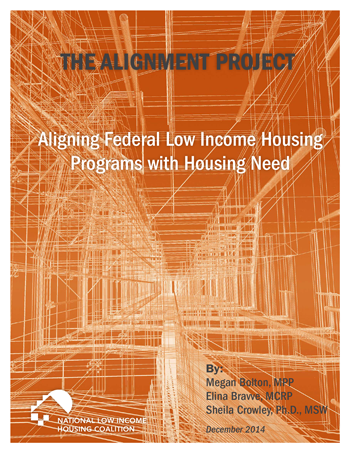New Report on Challenges and Solutions to Creating Affordable Housing for Lowest Income Americans
Dec 22, 2014
A report from the National Low Income Housing Coalition (NLIHC) highlights research findings on the extent to which existing federal rental housing production programs serve the lowest income households. NLIHC found that properties funded through the Low Income Housing Tax Credit (LIHTC) program rarely serve extremely low income (ELI) households, those with incomes at or below 30% of area median income (AMI) without relying on Housing Choice Vouchers (vouchers). This reliance is quickly becoming unsustainable as funding for the voucher program declines and program costs increase. The report also highlights strategies used by affordable housing developers to create rental units for this population and includes five case studies that feature innovative developers.
In an analysis of a random sample of LIHTC properties from five states, NLIHC found that 69% of the ELI households living in these properties have some type of rental assistance, primarily in the form of vouchers. This rental assistance is not only vital to the housing stability of these households, it is also critical to the success of the LIHTC properties because rental assistance payments often provide developers with contract rents that are greater than the allowable LIHTC rents, and are therefore subsidizing the operations of some LIHTC properties.
The report also shows the results of a survey of 241 affordable housing developers, with 33% having no units serving ELI households, 36% with fewer than half of their units serving ELI households, and 31% with more than half of their units serving ELI households. Fifty-six percent of the developers serving ELI households report that at least half of the ELI tenants have vouchers.
NLIHC also conducted in-depth interviews with 47 developers who said they served ELI households without the use of vouchers, and revealed a number of strategies to achieve deep levels of affordability. The strategies include: having a mix of units affordable to households at different income levels so that the rents paid by higher income households supplement the project operating expenses; layering multiple funding sources; using non-traditional resources, such as private donations, to fill funding gaps; reducing or eliminating mortgage debt; and cultivating strong local partnerships with municipal and/or state governments.
From these interviews, NLHIC completed five case studies. One case study features an 83-unit development in Jacksonville, FL that serves 42 ELI households, many of whom were previously homeless. Key to the success of this project was that the developer, Ability Housing, was able to capitalize an operating reserve funded through an increased developer fee. In Florida, projects serving homeless households are eligible for an increased developer fee, a feature of Florida Housing Finance Corporation’s strategy to support projects serving homeless households.
“It is clear from our research that it is becoming increasingly difficult to create units that are truly affordable to ELI households,” said Megan Bolton, Research Director at NLIHC, “however, we should pay close attention to some of the innovative strategies highlighted in this report, especially as we begin to think about how to use the first funds from the National Housing Trust Fund, 75% of which will go towards serving ELI households.”
The findings from each component of this research project will contribute to the broader conversation about simplifying the process of financing affordable housing developments, refining existing programs so that they incentivize developers to serve ELI households, and finding ways to fund the ongoing operating costs of units that do serve ELI renters. This conversation is more critical than ever with the announcement that the National Housing Trust Fund will finally receive its first funds early in 2016.
The report is available here.
Ms. Bolton is available for further comment.
About NLIHC
Established in 1974 by Cushing N. Dolbeare, the National Low Income Housing Coalition is dedicated solely to achieving socially just public policy that assures people with the lowest incomes in the United States have affordable and decent homes.
Contact
Christine Campbell
Vice President for Field and Communications
National Low Income Housing Coalition 202-662-1530 x247
[email protected]
www.nlihc.org
